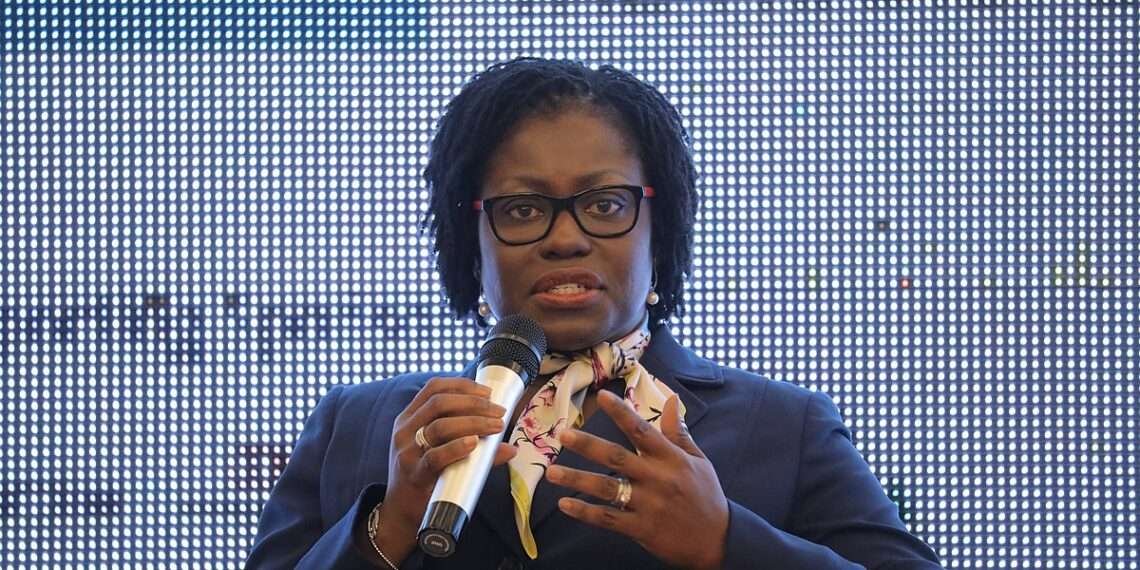Mrs. Elsie Addo Awadzi, Second Deputy Governor of Bank of Ghana (BoG), has urged Women-owned and women-led businesses to embrace digital financial services provided by banks to help formalize payments for their goods and services so as to help them build the relevant banking history needed to access critical financing for their businesses.
According to the Deputy Governor, embracing digital financial services is key to the success of women-led businesses which have been affected disproportionately by the pandemic since majority of them remain in the informal sector.
“Here in Ghana, female entrepreneurs are eight percent times less likely than men to access the kind of capital and other financial services and products that they need to start or scale up their businesses, according to the World Bank’s 2017 Global Findex Survey.
“What is more, the economic shock from the COVID-19 pandemic has impacted women-owned and women-led businesses disproportionately, given that many female entrepreneurs operate in the informal sector or in the MSME sector. For some of these, their businesses remain closed or struggle to regain lost markets and opportunities”.
Mrs. Elsie Addo Awadzi
Women in MSMEs in Ghana
Citing a World Bank study, Mrs. Awadzi stated that forty-four percent of micro, small, and medium enterprises (MSMEs) in Ghana are female-owned, and this sector accounts for about 92 percent of all businesses and contributes about 70 percent of Ghana’s GDP.
The Second Deputy Governor underscored that Women entrepreneurs and the businesses they own and lead, face serious challenges in Ghana and in other parts of the world. According to her, “data suggests that these businesses tend to remain smaller and less profitable than those owned by men, owing in part to limited access to business support services, markets, and finance”.
Goldman Sachs estimates that 70 percent of women-owned formal SMEs are unserved or underserved in terms of access to credit, amounting to a US$285 billion credit gap, and closing this credit gap in developing countries could lead to a 12 percent increase in per-capita GDP by 2030, she stated.
Touching on the recovery of the economy, Mrs. Awadzi highlighted that the banking sector has a major role to play in this regard. On the specific roles of financial institutions, she said “we expect banks to deploy technology and strategic partnerships to promote access to finance for all segments of our economy, including women-owned businesses, through innovative products, services, and delivery channels”.
“The Bank of Ghana expects banks and SDIs to continue in their efforts to support a strong recovery of the Ghanaian economy through reasonably-priced credit delivered in a prudent manner. Banks must promote gender equity in their lending and other operations and help support the transition to a greener economy, guided by the Sustainable Banking Principles launched in November 2019 by the Bank of Ghana, the Ghana Association of Bankers, and the Environmental Protection Agency”.
Mrs. Elsie Addo Awadzi
BoG to continue its support to economic recovery
The Deputy Governor indicated that the Bank of Ghana will continue to do its best within its statutory mandate to promote price stability and financial stability, all of which are key ingredients for the development of strong viable business.
Mrs. Elsie Addo Awadzi iterated that the Bank of Ghana has undertaken necessary and difficult reforms before the COVID-19 pandemic and at the onset of the pandemic, that positioned the banking sector in Ghana to play a critical role in helping to mute the effects of the pandemic on the real sector. She assured that the BoG is still doing its best to support the recovery of the Ghanaian economy.
“The Bank of Ghana remains committed to promoting a policy and regulatory environment that supports inclusive and broad-based economic growth where all economic actors including women entrepreneurs, are able to innovate and access appropriate forms of financing and at cost-effective rates to help launch, grow, and sustain their businesses”.
Mrs. Elsie Addo Awadzi
Mrs. Awadzi, who was speaking at the Second Anniversary Celebration of the Association of Ghana Industries’ Women in Business Initiative, lauded the initiative, emphasizing that it creates a platform for dialogue and also help promote more opportunities for women-owned and women-led businesses.
READ ALSO: Global Automotive E-Commerce Market To Expand By 24.8% Between 2022 And 2030 – MRFR




















